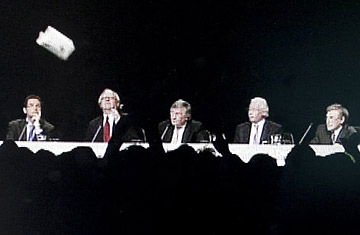
Fortis board members reacting as a document is thrown at them by Fortis shareholders during a shareholders meeting in Ghent.
On the face of it, the two events might seem unconnected. After months of government criticism and a slew of ugly headlines, Daniel Bouton announced last week that he plans to quit as chairman of Société Générale, one of France's biggest banks. A day earlier, a meeting of shareholders in banking giant Fortis turned nasty when investors riled by the sale of ts recently nationalized Belgian banking arm lobbed shoes and other items at chairman Jozef De Mey. De Mey stood his ground, and won an eventual vote on the sale. But the twin incidents share the same roots: public trust in the financial system — and its well-paid execs — has probably never been lower.
The reasons are well known. Debt-fueled and gluttonous, bankers around the world took wild risks that their bosses and regulators failed to stop. Throw in Bernard Madoff's massive fraud, and trust right now is as scarce as good credit. According to the Chicago Booth/Kellogg School Financial Trust Index, a new quarterly measure of Americans' confidence in financial institutions, faith in banks — on a scale of 1 to 5, where 1 denotes no trust and 5 complete confidence — fell from 2.95 to 2.8 in the first quarter of this year; trust in bankers slipped from 2.6 to 2.5. Things are even bleaker elsewhere. In a January ICM poll carried out across 17 of the world's leading economies — using a scale of 1 to 10 — public trust in the stability and solidity of banks came in at 4 in Germany, 4.2 in the U.K., and 5.1 in France. (See pictures of the global financial crisis.)
For governments, that's real cause for concern. It might not show up in the national accounts, but trust is vital for an economy to work. When we stash wages or savings with banks, we trust they'll be safe and accessible when we need them. When we squirrel money into a pension, we trust it'll pay back when we retire. In a paper published in 2006, academics from Italy, the Netherlands and Canada even found that trust levels between citizens of two countries has a significant effect on the investment decisions of venture capital firms, even after accounting for other factors such as geographical distance or transaction costs. "Virtually every commercial transaction," economist and Nobel laureate Kenneth Arrow wrote in 1972, "has within itself an element of trust."
As trust diminishes, so too do transactions. In a Chicago Booth/Kellogg School survey carried out late last year, trust in the stock market was considerably lower among those planning to take money out of it than it was among those intent on leaving their investment alone or even increasing it. Moreover, after controlling for investors' expectations of how the market might perform in the future, trust levels had a positive influence on the decision to invest more in the markets, the survey found. (Find out 10 things to do with your money.)
Just as alarming amid falling confidence: lower levels of trust in banks make customers more likely to yank their money, according to the survey. More than a tenth of those polled said they'd done just that during the crisis, preferring instead to keep their cash at home, despite the obvious dangers of doing so.
Here's the bigger problem: hiding money underneath the mattress risks making the financial system less efficient. And withholding investment from the stock market will depress company valuations. In other words, "if trust has been significantly affected by the crisis," Howard Davies, director of the London School of Economics, said in a lecture last month, "it will have damaging consequences for investment and growth in the future." (See pictures of the financial crisis in London.)
Restoring it is now vital. Part of that responsibility lies with the lenders themselves. "Banks need to know their business," said John McFall, chairman of Britain's Treasury Select Committee, during a recent debate on trust and financial markets organized by the Fabian Society, a left-leaning London think tank. In future, bosses ought to know their CDOs from the CDSs, McFall said, and not leave such understanding to the banks' "35-year-old Ph.D.s." Reining in sky-high bonuses, boosting capital reserves and sharpening risk management won't do any harm to public trust, either.
Politicians, too, need to play a crucial role in restoring confidence, not least by letting us know when and why banks deserve it. There's a snag with that, though: our leaders' own levels of trustworthiness are depressed amid the global downturn. In that ICM poll, the rate of trust in the government to manage the financial crisis was just 4.5 in Britain, similar to the level in France but higher than that of Germany. In the U.S., where citizens were polled only days after President Obama's election, confidence was higher, at 6.3. (See pictures of Barack Obama's family tree.)
Stressing independence from big business could boost a government's image. In the Chicago Booth/Kellogg School poll, 40% of Americans felt former U.S. Treasury Secretary Hank Paulson — previously the boss of Goldman Sachs — had been acting in the interests of the investment bank, and not America.
"It's much easier to scare off birds from a tree than to bring them back," says Luigi Zingales, professor of entrepreneurship and finance at the University of Chicago Booth School of Business, and co-creator of its trust index. "And that's what trust's about. It's much easier to destroy than to build."
